Welwyn Commentary Series (53 vols.)
Digital Logos Edition
Overview
Dedicated to the practical exposition and exhortation of Scripture, the Welwyn Commentary Series (53 vols.) contains over 13,000 pages of commentaries designed for pastoral ministry and preaching. Combining exegesis, hermeneutics, history, and pastoral insight, these scholarly resources are carefully crafted to meet the day-to-day needs of pastors as they grapple with the word of God.
From candid discussions about the rituals and symbols in Leviticus, to the crying pleas of the Minor Prophets, and the vivid imagery in the book of Revelation, the Welwyn Commentary Series emphasizes the meaning of the text for our everyday lives. Each section summarizes and explains a passage of Scripture, examining the intention of the author, the cultural context, and the questions and issues raised by the particular passage. These eminently readable commentaries also contain numerous illustrations and pointed application.
With Logos Bible Software, these valuable volumes are enhanced by cutting-edge research tools. Scripture citations link directly to English translations, and important terms link to dictionaries, encyclopedias, and a wealth of other resources in your digital library. Powerful searches help you find exactly what you’re looking for. Tablet and mobile apps let you take the discussion with you. With Logos Bible Software, the most efficient and comprehensive research tools are in one place, so you get the most out of your study.
- Detailed verse-by-verse exposition
- Ideal for sermon preparation and Bible study
- Numerous maps and illustrations
- Book outlines
- Over 13,000 pages of commentary for pastors
- Questions for further study
- Title: Welwyn Commentary Series
- Publisher: Evangelical Press
- Volumes: 53
- Pages: 13,475
This title is included in the following collections
You can save when you purchase this product as part of a collection.
2025 Baptist Platinum
$1,499.99$1,499.992025 Baptist Diamond
$2,999.99$2,999.99Logos 7 Baptist Portfolio Lega...
$4,749.99$3,324.992025 Baptist Portfolio
$4,749.99$4,749.99
- $23,999.99
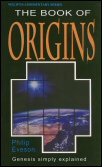
As its name implies, Genesis is a book of origins. In it we are told of the origin of the universe, the beginnings of the human race and the birth of the Israelite nation. But it is more than an early record of origins. It is part of God’s Word to us, what the apostle Paul calls ‘God-breathed’ Scripture. Here we are given infallible instruction concerning where we all came from and why things are the way they are.
The book of Genesis is also crucially important for our understanding of the rest of Scripture. It introduces us to the true and living God, to the beginnings of sin, its consequences and how it has affected the whole created order. It also tells of God’s grace and of his promises to bless a world of lost sinners under God’s curse. We are introduced to God’s covenant with Abraham and to the great plan of salvation for all nations. The book is a signpost to the fulfillment of these promises of the coming Messiah, Jesus Christ, the redemption he achieved and the new covenant he established through his atoning death.
The book is easy to follow, while at the same time being packed with solid teaching, especially biblical theology and sound application. It must have taken a great deal of toil to distill this much instruction into this volume.
—Journal of Dispensational Theology
Philip J. Eveson is a Welshman who has studied the biblical languages and theology at the University of Wales, the University of Cambridge, and the University of London. He trained for the Christian ministry at the Calvinistic Methodist College. After serving churches in South Wales, he was appointed vice-principal of the Kensit Memorial College in Finchley, North London. He has been the minister of Kensit Evangelical Church for 25 years and is now the principal of London Theological Seminary, where he has lectured since its inception.
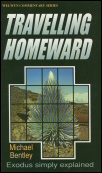
Travelling Homeward: Exodus Simply Explained
- Author: Michael Bentley
- Publisher: Evangelical Press
- Publication Date: 1999
- Pages: 352
Among other things, the book of Exodus tells of God’s miraculous rescue of his people from Egypt, the institution of Israel’s greatest festival, the Passover, the provision of God’s law, and the building of the tabernacle, which was the forerunner of the temple. In the New Testament there are many references made to the book of Exodus. An understanding of this exciting book will give us a better grasp of the attributes of God and of his wonderful plan of salvation through the Lord Jesus Christ.
In this book, Michael Bentley provides a clear, organized exposition of Scripture. His down-to-earth style helps students of Scripture, both preachers and their congregations, to grasp the meaning of the text without unnecessary difficulty.
Michael Bentley has an ability to expound the biblical text with clarity and accuracy. He has a passion to make that exposition accessible and relevant to a wide constituency of Christian believers. The result here in this commentary on Exodus is a book that helps us make a profitable journey through this most powerful of stories. It is informative, incisive, and superb in application. It will be suggestive to the preacher and stimulating to the general reader.
—John Tindall, co-pastor, Chessington Evangelical Church, Surrey, England
Michael Bentley is the pastor of Great Hollands Free Church in southern England, where he is also actively involved in the local community. Among other responsibilities he is vice-chairman of the Standing Advisory Council for Religious Education in the area, a director of the local Citizen’s Advice Bureau and vice-chairman of a neighborhood mediation service. He is author of several titles in the Welwyn Commentary Series, including Building for God’s Glory: Haggai and Zechariah, Shining in the Darkness: Philippians, and Passing on the Truth: 1 & 2 Timothy.
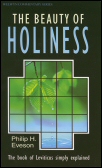
The Beauty of Holiness: Leviticus Simply Explained
- Author: Philip J. Eveson
- Publisher: Evangelical Press
- Publication Date: 2007
- Pages: 416
Leviticus is among the least read and understood books of the Bible. The contents may even seem boring and uninviting. Why should we study a book that begins and ends with animal sacrifices and presents detailed laws concerning ritual purity and priestly practices?
The answer is that Leviticus is part of God’s Word. It tells us what is true and of eternal benefit to our lives. Here is a book to make us wise about salvation. The things that happened to Israel in the Old Testament are symbolic pointers to the wonderful salvation we have begun to enjoy in Christ.
Like Israel of old, we need to be constantly reminded of who God is, how he is to be approached and worshipped and how we should live our lives as God’s people in a hostile environment. Leviticus indicates the kind of people God’s covenant community ought to be in the light of God’s grace.
At the same time and in its own special way, Leviticus points us forward to the one who came to save his people from their sins and bring them to God. Without this book we cannot begin to understand the death of Christ and his priestly work on our behalf. Neither can we appreciate the many references to cleansing, purity, wholeness, separation, and holiness that we find in the New Testament. It is also from this book that Jesus quoted the second great commandment: “You shall love your neighbor as yourself.”
Many who set out with the good intention of reading consecutively through the Scriptures come to a grinding halt at Leviticus. Philip Eveson’s book will get one going again and should prove a corrective to the attitude that sees Leviticus—not to mention other substantial elements of the Old Testament—as obscure, dry, and irrelevant.
—John Tindall, co-pastor of Chessington Evangelical Church, Surrey, England
The Beauty of Holiness is laid out quite helpfully in 33 very manageable sections, dealing mostly with self-contained units in the text of Leviticus. This arrangement will certainly prove useful for the preacher or teacher who undertakes an exposition of the book of Leviticus, giving him insight into how the text is naturally structured, and how it might best be broken down and headed for maximum clarity. It is also a well-adapted structure for the devotional reader at home: indeed, I can think of few better strategies for a month or so of devotional reading than to read every day one of the suggested portions of Leviticus, together with the corresponding chapter from Eveson. This is not just a commentary for clergy and theologians. It was designed for the everyday Christian who is hungering to know more of the person and work of Christ, the way in which to receive his grace, and the nature of our obligations to him.
—Nathan Pitchford, author, What the Bible Says About the Doctrines of Grace
Philip J. Eveson is a Welshman who has studied the biblical languages and theology at the University of Wales, the University of Cambridge, and the University of London. He trained for the Christian ministry at the Calvinistic Methodist College. After serving churches in South Wales, he was appointed vice-principal of the Kensit Memorial College in Finchley, North London. He has been the minister of Kensit Evangelical Church for 25 years and is now the principal of London Theological Seminary, where he has lectured since its inception.
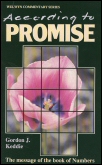
According to Promise: The Message of the Book of Numbers
- Author: Gordon Keddie
- Publisher: Evangelical Press
- Publication Date: 1993
- Pages: 224
The book of Numbers bridges the gap between the exodus from Egypt and the entry into the Promised Land, when God’s people were in transit between past and present, slavery and freedom, as they passed through the Sinai desert. It is about the church in the wilderness, on a journey from promise to fulfillment. As such it has much to teach us on a practical level about trust in God in the face of difficulties, about the temptations we face and the faithfulness of God who remains true to his promises in spite of all our waywardness and mistrust of him.
What was fulfilled for Israel in the possession of Canaan also looks ahead, on a deeper level, to its true fulfillment in the advent of Jesus Christ and the New Testament era. Rightly understood, Numbers is a milestone to Calvary, a stretch of the road that leads to Christ and ultimately to heaven itself.
The modern church needs the message of Numbers. Like Israel of old, the church today has compromised the claims of God’s Word to a fearful degree and is reaping the inevitable consequences of apostasy. Numbers shows with uncomfortable clarity why so many churches are sterile shells of what they might have been, but also holds out the brilliant prospects of divine blessing for all who will commit their way to the Lord, according to his promises in the gospel of his Son, the Lord Jesus Christ.
Gordon Keddie has the ability to write in a clear, lucid manner. One is never left in doubt as to what he is trying to say.
—The Monthly Record
Gordon Keddie is the minister of Grace Presbyterian Church in State College, Pennsylvania.
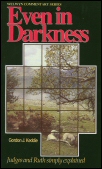
The period of the judges was an evil one, requiring hard words for hard times. The people of Israel had rejected their God for the desire of an earthly ruler, and had rebelled against his laws. Yet even in this time of unbelief and hypocrisy, God raised up men and women to call his people back to a personal faith in the living God.
The author, in taking us through the books of Judges and Ruth, challenges Christians to live consistently with their professions of faith, and shows that even in darkness, God offers a message of hope and victory to those who will faithfully follow him.
Gordon Keddie is the minister of Grace Presbyterian Church in State College, Pennsylvania.
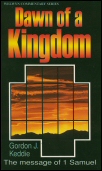
Dawn of a Kingdom: The Message of 1 Samuel
- Author: Gordon Keddie
- Publisher: Evangelical Press
- Publication Date: 1988
- Pages: 274
The absolute sovereignty of God and the triumph of his righteousness are the principal themes of 1 Samuel. In tracing the development of Israel from the anarchy of the period of the Judges, from Samuel the prophet and kingmaker through Saul, the people’s choice, to David, God’s chosen king—the hand of God is seen at work.
The true consequences of rebellion against the Lord are shown. There is no glamour in the Bible’s representation of sin. Saul clings to his sins and perishes. But the Gospel shines through, too. Samuel and David cleave to the Lord and are clothed with the robes of redemption. The reader is pointed to the victory of Christ, the true King of whom David is only a picture, who is saving his people from their sins this very day.
Gordon Keddie is the minister of Grace Presbyterian Church in State College, Pennsylvania.
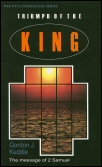
The history of David—the unfolding drama of 2 Samuel—gives us a slice of life in the real world. We see people in their true colors: the petty, selfish, murderous, yet fiercely loyal, Joab; the war-lord Abner, honorable perhaps, but only when it suited him; the sad, incompetent Ish-Bosheth; and the miserable and vicious sons of Rimmon, who murdered Ish-Bosheth in his sleep. And there is David, the man after God’s own heart, borne along by his regal calling on the tide of God’s mighty providential acts.
Gordon Keddie draws out the lessons of 2 Samuel and encourages us to look expectantly for the blessing of God in our day since the story of David is a picture of David’s royal Son, the Lord Jesus Christ, the Mediator-King who rules over all things and will, in the fullness of his time, deliver up his consummated kingdom to his Father and ours.
. . . A scholarly work . . . this book is a penetrating study of Israel’s history during the times of David. . . . There is continual application to the life of the saint in the twentieth century.
—Jim Cromarty, author, King Of The Cannibals: The Story of John G. Paton, Missionary to the Hebrides
Gordon Keddie is the minister of Grace Presbyterian Church in State College, Pennsylvania.
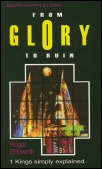
From Glory to Ruin: 1 Kings Simply Explained
- Author: Roger Ellsworth
- Publisher: Evangelical Press
- Publication Date: 2000
- Pages: 256
1 Kings traces the history of God’s people from the heights of glory and prosperity enjoyed during the reign of Solomon, through the subsequent division into separate northern and southern kingdoms, and on to the dark days of Elijah’s lone stand on Mount Carmel against the worshippers of the false God Baal and its aftermath. The example of Solomon and those who followed him stands as a stark warning to Christians today of the serious consequences of disobedience to God’s revealed Word. The same God who would not countenance devotion to false gods will brook no rivals in the affections of his people today.
But 1 Kings is not only a book about human failure. It is also a book about God’s sovereign purpose, which cannot be thwarted and defeated by human disobedience. In the story of the kings of Israel and Judah, as in all the Old Testament narrative, we see God pointing people to the coming King of whom Solomon, in all his splendor, was only a faint and imperfect picture.
Roger Ellsworth is pastor of Parkview Baptist Church in Jackson, Tennessee. He is the author of more than 40 books.
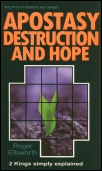
As 2 Kings opens, we find the people of God divided into two kingdoms: Israel and Judah. Neither kingdom was to last. By the end of the book both kingdoms had been taken captive—Israel by the Assyrians and, over 130 years later, Judah by the Babylonians. It is impossible for us today to comprehend adequately just how devastating it was for the Israelites to be taken into captivity in this way. They needed help, and the author of 2 Kings provided it for them. He wrote to explain why the exile had taken place, to urge them to guard against dangers which they faced while in exile, and to give them hope for the future.
The themes hammered home by 2 Kings are just as vital for God’s people today. We too must obey God’s command to worship and serve him alone. We must always pay careful heed to his Word. Like the readers of 2 Kings, we can, and must, trust his promises. With these things firmly in place, we can face an uncertain future with a clear sense of direction and with a deep peace.
Kings is explored with New Testament insight and every exegetically sound opportunity is taken to draw attention to the person and work of the Lord Jesus Christ. There is also a great deal of pastoral application woven into every chapter.
—Evangelical Times
Roger Ellsworth is pastor of Parkview Baptist Church in Jackson, Tennessee. He is the author of more than 40 books.

A Family Tree: 1 Chronicles Simply Explained
- Author: Andrew Stewart
- Publisher: Evangelical Press
- Publication Date: 1997
- Pages: 222
The book of Chronicles is an important part of the Old Testament. Originally written as one book, 1 and 2 Chronicles summarize, not only the history of God’s people from the creation of the world until the edict of Cyrus in 538 BC, but also the theology of the Old Testament—the revelation that God gave of himself at creation, to the patriarchs, through Moses, during the monarchy, exile, and restoration.
1 Chronicles takes this narrative up to the establishment of the monarchy under David, culminating in the building of the temple. The underlying message is that of a covenant God who provides salvation for his people, through a Redeemer foreshadowed by the deliverer-kings whom God gave to his people.
I found this most helpful commentary eminently readable, with excellent use of telling everyday illustrations, with pointed applications constantly made, good links with New Testament passages, and best of all, an interpretation that consistently pointed forward to Christ.
—Hugh J. Blair, emeritus professor of Old Testament language and literature, Reformed Theological College, Belfast
Andrew Stewart is the minister of Glenmanus Reformed Presbyterian Church, Portrush, Northern Ireland. He was born and educated in Northern Ireland. He studied law at Queen’s University, Belfast before going on to study theology at the Reformed Theological College, Belfast and the Reformed Presbyterian Theological Seminary, Pittsburgh. He also serves as clerk for the Synod of the Reformed Presbyterian Church of Ireland.
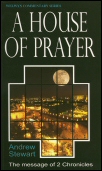
The book of 2 Chronicles continues the narrative of 1 Chronicles with the reign of Solomon, the most glorious period in the whole history of Israel, and focuses especially on the construction and dedication of the temple as the place where God was to be worshipped in the way he had appointed. Following the division of the kingdom, the Chronicler concentrates almost exclusively on the history of Judah and the godly remnant who remained loyal to the line of David and to the worship of the temple. The book ends on a note of promise as the first exiles prepare to return to the land and rebuild the temple after the 70 years of captivity of Babylon.
Throughout, we see that even though God’s people may repudiate his covenant with them, God himself remains faithful to his covenant promises. Above all, we are pointed forward to Christ, in whom the promises both of the Messianic King and the temple find their ultimate fulfillment.
This eminently helpful commentary opens up this often neglected book, and points out the emphases that make this history distinctive from the history recorded in Kings. Most importantly it continually points us to Christ, the fulfillment of the temple with which 2 Chronicles opens; and teaches us how to understand much of the Old Testament’s history and how it relates to Christ.
—Mark Loughridge, pastor, Reformed Presbyterian Church of Ireland
Andrew Stewart is the minister of Glenmanus Reformed Presbyterian Church, Portrush, Northern Ireland. He was born and educated in Northern Ireland. He studied law at Queen’s University, Belfast before going on to study theology at the Reformed Theological College, Belfast and the Reformed Presbyterian Theological Seminary, Pittsburgh. He also serves as clerk for the Synod of the Reformed Presbyterian Church of Ireland.
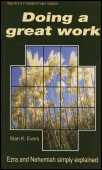
Doing a Great Work: Ezra and Nehemiah Simply Explained
- Author: Stan K. Evers
- Publisher: Evangelical Press
- Publication Date: 1996
- Pages: 224
The books of Ezra and Nehemiah continue the story of God’s people after the exile in Babylon. The historical events recorded in them are important for us because they were all part of God’s plan to prepare the way for the coming of the Savior and preserve a pure people for the setting up of Christ’s kingdom.
In an age of experience-centered worship and entertainment-oriented evangelism, these two books direct our thoughts to a holy God who demands reverent worship and uncompromising loyalty from his people. Furthermore, Ezra and Nehemiah call us back to a renewed obedience to God’s Word, a fresh realization of the power of prayer, and wholehearted commitment to the work of God in fellowship with the people of God.
Stan K. Evers studied at Kensit Memorial College in London and the London Reformed Baptist Seminary organized by the Metropolitan Tabernacle. Following an itinerant ministry with the Protestant Truth Society, he served for nine years as a pastor in East London and is at present pastor of Potton Baptist Church in Bedfordshire, England. He is a regular contributor to the Geneva Bible Notes, Grace Magazine, and the Gospel Magazine
.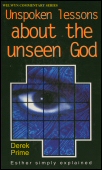
Unspoken Lessons about the Unseen God: Esther Simply Explained
- Author: Derek Prime
- Publisher: Evangelical Press
- Publication Date: 2001
- Pages: 144
When it seems that God is not active in human affairs, he may be most at work. He may be most present when he seems most hidden. Nowhere is this more clearly illustrated than in the book of Esther. Although God’s name is not mentioned in the book, the discerning reader may see the hand of God throughout the narrative, as he brings his purposes to pass for the good of his people.
Derek Prime shows how the message of Esther is one of encouragement for God’s people in times of crisis. God is in command of human actions and human delays. Nothing escapes his notice, or happens without his permission. Even the worst things will work out for our good. We see only links in the chain, but he sees the end from the beginning, as the source, guide, and goal of all that is. Sovereignty and providence are attributes of our heavenly King. Providence, not chance, rules.
The book of Esther challenges all believers to maintain a faithful witness in an unbelieving and hostile world, secure in the knowledge that their lives are in the hands of the God who has already accomplished on their behalf the greatest deliverance of all, through the death on the cross of our Savior, the Lord Jesus Christ.
Derek Prime has served churches in the United Kingdom as a pastor for more than 30 years in London and Edinburgh.
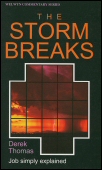
The Storm Breaks: Job Simply Explained
- Author: Derek Thomas
- Publisher: Evangelical Press
- Publication Date: 2003
- Pages: 352
The book of Job is the harrowing story of a man whose life changed so dramatically in the course of a few short days. It is about the problem of suffering, and the answer to the problem is not seen in the comments of Job’s friends but in his own response to suffering. The book of Job teaches us how to respond to difficulties in our lives.
Job’s acceptance of his loss is a model of piety. When Job responds with questions and even a measure of bitterness and anger, his frustration is always taken directly to God. Job never lost faith. He is a model of cross-bearing and he teaches us to persevere even in the most incomprehensible ways of God in our lives.
Derek Thomas was born and raised in Dyfed, Wales, and trained for the ministry at Reformed Theological Seminary in Jackson, Mississippi. He was the minister of Stranmillis Evangelical Presbyterian Church, Belfast, and is currently associate professor of systematic and practical theology at the Reformed Theological Seminary as well as minister of teaching at the First Presbyterian Church in Jackson, Mississippi. He is a respected author, lecturer, and international conference speaker.
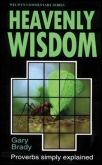
The book of Proverbs is intensely practical. Here is “truth in street clothes.” It deals with everyday subjects such as laziness, pride, handling money, and telling lies. Here we meet familiar folk such as the bargain-hunter, the neighbor you see too much of, the practical joker, and the “morning person” who forgets that others take a while to surface.
Charles Bridges once said that of all Old Testament books it is the one which we may think of as most distinctively educational. This is its tone. A speaker speaks to his student, an old man to a young man, and a father to his son.
Above all, Proverbs points us to Christ, the one “who has become for us” who believe “wisdom from God.” Here is an excellent place to begin to learn about Christ and about wisdom. It has been said that, as the Psalms give us Christ singing the law, so the Proverbs give us him meditating on it. Truly to understand him, we must get to grips with Proverbs. Truly to be wise, we must get to grips with Christ.
For 20 years, Gary Brady has pastored an inner-city London congregation of all ages, inter-racial and multi-abilitied. This rich commentary on the book of Proverbs began its life in the regular sermons of the Lord’s Day. It was written in the midst of all the pastoring, evangelism, committee work, editing, and writing of an exemplary twenty-first century minister of Jesus Christ. I stand in awe and admiration of him.
—Geoff Thomas, pastor, Alfred Place Baptist Church, Aberystwyth, Wales
Gary Brady has been the pastor of Childs Hill Baptist Church in northwest London since 1983. A native of South Wales, prior to studying for the ministry at London Theological Seminary he earned a degree in English at Aberystwyth and later trained as a teacher in Cardiff. He is currently studying historical theology with the John Owen Centre.

A Life Worth Living and a Lord Worth Loving: Exposition of Ecclesiastes and the Song of Solomon
- Author: Stuart Olyott
- Publisher: Evangelical Press
- Publication Date: 1993
- Pages: 128
Has life really any meaning? Our time in this world is comparatively short. The earthly stage remains, but different actors are constantly passing across it. Generations come and go, but nothing is ultimately different.
This is how many people see life, and Solomon identifies with them. But is life really pointless? If not, what is its true meaning? The message of Ecclesiastes is that life is not worth living unless we live it for God. The Song of Solomon teaches us that living for the Lord means loving him.
Stuart Olyott’s easy to read commentary on Ecclesiastes and Song of Solomon. Both books of the Bible that are overlooked and misunderstood, Olyott helps the reader see the true meaning of each book while keeping the commentary simple and short. Each chapter leaves you yearning to know Christ better. This book is a great enhancement to personal Bible study, as are the other commentaries by Olyott in our library.
With candor, the author confesses that for many years he neglected these books of Solomon. His commentary actually conveys his joy at discovering their powerful relevance and meaning for today.
—Christian Update
Stuart Olyott has many years of pastoral experience. In Lausanne, Switzerland, he was pastor of L’Eglise Evangelique Baptiste and involved in pioneer work in several areas. He is currently ministering in a large inner-city church in Liverpool, England. He is author of several books, including several in the Welwyn Commentary Series.
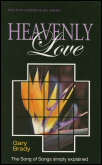
“In all the world there is nothing to equal the day on which the Song of Songs was given to Israel, for all the Scriptures are holy, but the Song of Songs is the Holy of Holies.” This statement by a second-century rabbi contrasts sharply with the attitude of some Christians today, who apparently have little place for this book in their thinking or practice. They hardly ever quote it, read it, or reflect on it. Such extremes remind us that the book has sometimes been controversial. More than one scholar has called the Song of Songs the most difficult book to interpret in the Old Testament.
Gary Brady adopts the view that, when he wrote, the biblical author had in mind both a natural and a spiritual understanding, and that those who originally received the book as Scripture understood it both in terms of human love and intimacy and as a portrait of the loving relationship between God and his people. In our own day a study of this ancient book is crucially needed in both these areas.
Firstly, in this modern world of mass media, through advertising, cinema, television, and the World Wide Web, we are inundated with false images of love, sex, and marriage. We are bombarded with misleading ideas and, even if we are able to keep our minds pure, it is still very easy for inaccurate concepts to worm their way in and have their debilitating effect on us. All of us—single, married, divorced, widowed, young, old, male, female—need to be crystal clear on this vital subject.
Secondly, there is the vital issue of intimacy with Jesus Christ. One of the purposes of this commentary is to help us see how lovely the Lord Jesus is, how attractive, how appealing. The aim is for us to see again something of Christ’s beauty and glory, his comeliness and splendor, and so to be drawn to him. The Song of Songs can be of tremendous help to us in this direction.
Gary Brady has been the pastor of Childs Hill Baptist Church in northwest London since 1983. A native of South Wales, prior to studying for the ministry at London Theological Seminary he earned a degree in English at Aberystwyth and later trained as a teacher in Cardiff. He is currently studying historical theology with the John Owen Centre.
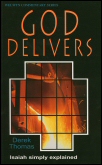
In a world of flippant convictions and a declining sense of God’s awe and wonder, it is Isaiah’s conviction that the church needs to remember the consequences of God’s holy character and live accordingly if she is to experience blessing and revival. It is not God’s faithfulness, but ours, which is in question. God Delivers: Isaiah Simply Explained is a probing and accessible commentary on this important book.
This commentary is what we would expect from Derek Thomas. It reflects his sound theology, his clarity of thought, his gifts as a preacher, and his keen spiritual insight. It is warmly commended, not only to preachers, but to all who love a challenging presentation of God’s Word.
—Banner of Truth
With maps and charts, the story of Isaiah and his people are commented upon thoughtfully and devotionally.
—Presbyterian Herald
Derek Thomas was born and raised in Dyfed, Wales, and trained for the ministry at Reformed Theological Seminary in Jackson, Mississippi. He was the minister of Stranmillis Evangelical Presbyterian Church, Belfast, and is currently associate professor of systematic and practical theology at the Reformed Theological Seminary as well as minister of teaching at the First Presbyterian Church in Jackson, Mississippi. He is a respected author, lecturer, and international conference speaker.
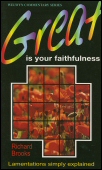
Lamentations is not familiar territory for many Christians, yet it deals searchingly with abiding themes such as the spiritual glory of the church and the tragedy when this is lost. It is a book that speaks directly to the confused Christianity and evangelicalism of our day.
Richard Brooks’ warm and pastoral exposition applies the great theme of God’s just dealing with a backsliding Judah to contemporary Christianity and reminds members of the church of Christ to examine themselves and take encouragement: “Because of the Lord’s great love we are not consumed, for his compassions never fail. They are new every morning; great is your faithfulness.”
This book will stimulate holy living and prove useful as an introduction for those who have never grappled with Lamentations.
—Banner of Truth
Richard Brooks is the pastor of York Evangelical Church in England. He is also author of Focus on the Bible: Song of Songs.

Ezekiel’s name means “God strengthens.” Every time the prophet’s name was mentioned, God’s people were assured of his help and reminded of his promise to “strengthen the weak.”
Ezekiel lived in times of great political turmoil and witnessed the final collapse of Judah to the Babylonian empire. His total, unquestioning willingness to do God’s will, often at great cost to himself, during the long years of his faithful ministry in exile, is a shining example to Christian workers everywhere.
The message of Ezekiel is one of God’s faithfulness to his covenant, both in carrying out judgment on sin and in the restoration and blessing of a remnant through the coming of the Messiah, Jesus Christ. The prophet’s final vision looks forward to days of great blessing, encompassing not only the restoration from exile, but the blessings of the new covenant and the final glory of heaven.
Derek Thomas was born and raised in Dyfed, Wales, and trained for the ministry at Reformed Theological Seminary in Jackson, Mississippi. He was the minister of Stranmillis Evangelical Presbyterian Church, Belfast, and is currently associate professor of systematic and practical theology at the Reformed Theological Seminary as well as minister of teaching at the First Presbyterian Church in Jackson, Mississippi. He is a respected author, lecturer, and international conference speaker.
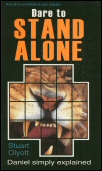
Dare to Stand Alone: Daniel Simply Explained
- Author: Stuart Olyott
- Publisher: Evangelical Press
- Publication Date: 1993
- Pages: 176
Here is a commentary for those who would like to read and enjoy the book of Daniel. The symbolism and apparently mysterious passages in the book have discouraged many from giving it serious study. But Stuart Olyott, in his lively yet thorough style, shows that the prophecy of Daniel is basically an easy book to understand. His aim is to excite readers to read Daniel for themselves.
The book of Daniel is full of practical help—especially for believers who find themselves standing alone in the classroom or at work, or among their family and friends. Daniel tells us how to remain true to God in a hostile environment, and shows us how to live for him when everything is against us. Daniel dared to stand alone. So can we.
Stuart Olyott has many years of pastoral experience. In Lausanne, Switzerland, he was pastor of L’Eglise Evangelique Baptiste and involved in pioneer work in several areas. He is currently ministering in a large inner-city church in Liverpool, England. He is author of several books, including several in the Welwyn Commentary Series.
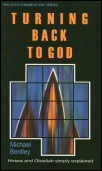
Turning Back to God: Hosea and Obadiah Simply Explained
- Author: Michael Bentley
- Publisher: Evangelical Press
- Publication Date: 2001
- Pages: 255
The prophecies of Hosea and Obadiah, along with the other so-called Minor Prophets, are all too frequently overlooked by contemporary Christians, and we are much the poorer as a result.
The weakness of the churches in our generation is largely due to our ignorance of the character of God. Nowhere in the Bible is that character more clearly expounded than in the ministry of the prophets. If the church neglects to listen to God’s Word of self-revelation through them, we shall be condemned to a superficial sentimentalism in our view of God, which will inevitably be blown away, like dust, in the storms of life.
Both Hosea and Obadiah came to teach the unchanging character of the covenant God to a deaf and careless people. In the midst of all the uncertainties and unpredictability of the tides of human history, the rock of God’s sovereign immutability stands, immovable and totally dominant. That was what God’s people needed to know then and it is exactly the same message which Christians today need to hear and heed.
Here is a commentary which is a sure guide to these two remarkable Old Testament books. Preachers will find it a useful resource for the pulpit, and ordinary Christians who desire to live faithfully for God will benefit greatly from its instruction.
It is a special treat to welcome this exposition of these two books, and to commend Michael Bentley’s careful explanation and application of the Old Testament material for the contemporary church.
—David Jackman, director of the Cornhill Training Course, London
Michael Bentley is the pastor of Great Hollands Free Church in southern England, where he is also actively involved in the local community. Among other responsibilities he is vice-chairman of the Standing Advisory Council for Religious Education in the area, a director of the local Citizen’s Advice Bureau and vice-chairman of a neighborhood mediation service. He is author of several titles in the Welwyn Commentary Series, including Building for God’s Glory: Haggai and Zechariah, Shining in the Darkness: Philippians, and Passing on the Truth: 1 & 2 Timothy.
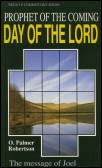
For such a short book, the prophecy of Joel deals with weighty matters that continue to have significance even today. The certainty and severity of God’s judgments that are to fall first on God’s own people and then on all the nations of the world, and the prominence of the Day of the Lord in the purposes and plans of God, all display the Lordship of God in human history. Joel summons God’s people to heart-felt repentance and the glorious truth of the consummate blessing of the Lord in the renewal of the earth by the outpouring of his Spirit on men and women, young and old, Jew and Gentile.
O. Palmer Robertson gained his Bachelor of Divinity degree from Westminster Seminary and his Master’s and Doctorate from Union Theological Seminary, Virginia. Dr. Robertson was active in the establishment of the Presbyterian Church in America and has worked in various church ministries as well as seminary teaching. He has numerous books in print, including Psalms in Congregational Celebration. He is a frequent lecturer and conference speaker in Africa, Europe, Latin America, and North America.
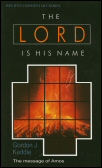
The message of Amos is pre-eminently a message of new life. The message, however, comes in the context of a nation under judgment. Israel hid the emptiness and godliness of a corrupt society behind an apathetic and nominal outward religion, like so many today.
God’s view of our society is revealed in Amos in no uncertain terms. While no refuge is offered for those who reject or disregard God’s will, shining through the gloom most brightly is the precious gift of new life through faith in God’s Savior, his Son Jesus Christ.
. . . A crisp, well-written exposition.
—John L. Mackay, professor of Hebrew and Old Testament literature, Free Church College, Edinburgh
Gordon Keddie is the minister of Grace Presbyterian Church in State College, Pennsylvania.
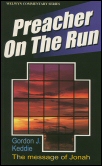
Preacher on the Run: The Message of Jonah
- Author: Gordon Keddie
- Publisher: Evangelical Press
- Publication Date: 1993
- Pages: 144
All the prophets of the Old Testament are milestones along the road to Calvary, but the prophecy of Jonah opens a special window on the New Testament age, when the Lord Jesus Christ would be proclaimed to all the ends of the earth.
. . . Commended for its solid and practical exposition. . . . This volume should be widely read.
—Stephen Dray, principal, Moorlands College, Christchurch, England
Gordon Keddie is the minister of Grace Presbyterian Church in State College, Pennsylvania.
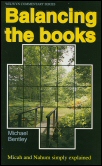
The prophecies of Micah and Nahum were delivered to the people of the southern kingdom of Judah, although Nahum’s message came about 100 years after Micah. Both were given under the shadow of the threat of invasion from the mighty Assyrian empire, which had already taken captive Judah’s northern neighbor, Israel.
In calling the people to repentance, Micah denounces idolatry and hollow ritualism as well as violence, covetousness, and the exploitation of the poor by the rich. The task of Nahum was to predict that the days of Nineveh, the capital of Assyria, were numbered. These were solemn warnings, but with them came messages of hope for God’s people as Nahum predicts the final downfall of those who oppress them, while Micah speaks clearly of the coming Messiah who would be born in Bethlehem and who would come to reign in righteousness. Micah proclaims the pardoning God who delights to show mercy.
In this commentary, Michael Bentley shows that these prophecies are still relevant for God’s people today. The Lord is still in control over the nations and the lives of individuals and one day he will balance the books as all will have to give an account of themselves to him. Yet for those who trust in him he is still, to use Nahum’s words, “a refuge in times of trouble” and the messenger is still “one who brings good news who proclaims peace.”
Michael Bentley is the pastor of Great Hollands Free Church in southern England, where he is also actively involved in the local community. Among other responsibilities he is vice-chairman of the Standing Advisory Council for Religious Education in the area, a director of the local Citizen’s Advice Bureau and vice-chairman of a neighborhood mediation service. He is author of several titles in the Welwyn Commentary Series, including Building for God’s Glory: Haggai and Zechariah, Shining in the Darkness: Philippians, and Passing on the Truth: 1 & 2 Timothy.
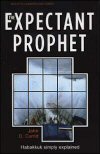
The prophecy of Habakkuk reveals to us—as does no other book in Scripture, an almighty God with absolute sovereignty, a God who requires that His people trust Him absolutely even when things do not seem to be going to plan. This is an emphasis that is much needed in the church today. The self-centeredness that characterizes our society today is almost overwhelming. We, like the people in Habakkuk’s day, need a radical change in our thinking, acknowledging that it is God who is at the center of reality, not we ourselves. This message is at the heart of Habakkuk’s prophecy and author John Currid illuminates this reality brilliantly against the backdrop of ancient Israel.
John Currid is the Carl McMurray Professor of Old Testament at the Reformed Theological Seminary in Jackson, Mississippi.
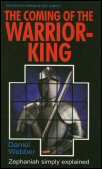
The Coming of the Warrior-King: Zephaniah Simply Explained
- Author: Daniel Webber
- Publisher: Evangelical Press
- Publication Date: 2004
- Pages: 190
One of the greatest needs of the modern church is to know God and to know him better. We need a knowledge of God that not only stimulates the mind, but moves the heart to worship, and the will to obey.
The most clear and certain source of such knowledge is, of course, to be found in the Bible. The books of both its Old and New Testaments furnish us with the kind of knowledge that is crucial to the life-changing discovery we wish to enjoy. However, if there is one part of that revelation that is more likely than others to be neglected it is that group of books collectively known as the Minor Prophets. And this is a pity, because these books contain a rich vein of insight into the character of God. They also contain a necessary counter to the slight and superficial views of God which seem so prevalent at the present time.
In contrast, the prophecy of Zephaniah in particular presents us with an awesome picture of the God who really is, and whom we are all one day destined to meet. It also beckons us—indeed, it pleads us—to face up to what it will mean to meet the living God.
Daniel Webber is mission director of the European Missionary Fellowship, which has its headquarters in Welwyn, Hertfordshire, England. He has been with the EMF since 1990 and, in addition to leading the work of the mission, is principal of its School of Biblical Studies. His teaching responsibilities include apologetics, modern church history, and pastoral theology. Prior to joining the EMF, he was pastor of an independent evangelical church in Kent for nearly 18 years.
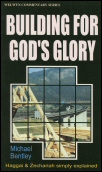
Times were tough for the first recipients of the prophecies of Haggai and Zechariah. They needed to be encouraged to resume the work of reconstructing the temple—to awake from their lethargy and to be enthusiastic for a life lived in obedience to God.
The people were still very materialistic in their outlook. Their zeal was for ritual rather than reliance on the Lord. Their concern was for respectability in religious observance rather than an acknowledgement of their sin and a desire to please God in all their thoughts and actions.
Michael Bentley has written a worthy addition to the Welwyn Commentaries in giving a straightforward explanation of these two prophecies and applying their message practically to the needs of the church today.
An excellent, simple, forthright exposition which gets to the heart of the message and effectively and consistently applies it to the modern reader.
—Eryl Davies, principal, Evangelical Theological College of Wales
Michael Bentley is the pastor of Great Hollands Free Church in southern England, where he is also actively involved in the local community. Among other responsibilities he is vice-chairman of the Standing Advisory Council for Religious Education in the area, a director of the local Citizen’s Advice Bureau and vice-chairman of a neighborhood mediation service. He is author of several titles in the Welwyn Commentary Series, including Building for God’s Glory: Haggai and Zechariah, Shining in the Darkness: Philippians, and Passing on the Truth: 1 & 2 Timothy.
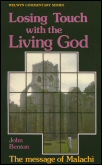
Losing Touch with the Living God: The Message of Malachi
- Author: John Benton
- Publisher: Evangelical Press
- Publication Date: 1993
- Pages: 144
For many people, their Christian life has become indifferent. Faith has lost its edge and the great enthusiasm which followed their conversion has gradually cooled. The Christian life has become comfortable and easy. It almost seems as if they are losing touch with the living God.
While this may be a description of ourselves and even of the church today, it was the state of Israel at the time of Malachi. The prophet addresses the problem of spiritual degeneration, the fossilizing of our faith, and through Malachi God challenges and accuses Israel about their spiritual condition.
In this volume, John Benton shows how Malachi’s book is a call from lax and hallow religion and points the way back to genuine, enduring faith in the Lord who does not change.
John Benton is pastor of Chertsey Street Baptist Church, Guildford, England, and editor of Evangelicals Now.
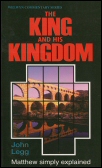
According to the Lord Jesus Christ, our first priority must be to seek the kingdom of God. The aim of Matthew’s Gospel is to help the Christian fulfill that duty. To do this, we must above all honor, trust, and serve the King himself, Jesus Christ. This commentary must, therefore, be both Christ-centered and practical. Its focus is the King and his kingdom.
John Legg is a retired pastor now living in South Wales. He has ministered at Shrewsbury Evangelical Church and previously in North Yorkshire for a total of over 40 years.
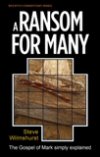
A Ransom For Many: The Gospel of Mark Simply Explained
- Author: Steve Wilmshurst
- Publisher: Evangelical Press
- Publication Date: 2011
- Pages: 320
This book is based on a series of sermons preached at Kensington Baptist Church in Bristol, England. The author has increasingly—and beyond his expectations—been drawn in by the sheer power of the storytelling. Grasping something of the skilled and beautiful construction of the gospel has frequently shed fresh light on familiar passages; recognizing the half-concealed links to the Old Testament prophets has opened up new understanding of the mission of the Lord Jesus.
Mark’s gospel focuses on the Lord Jesus as the crucified Christ; as his followers we are called to take up our cross and follow him who gave his life as a ransom for many. If this book encourages you in this path of discipleship, it will have achieved its purpose.
This clear, lively, readable, and accessible study is the fruit of sound scholarship. Steve Wilmshurst has worked carefully over the critical and sometimes controversial issues of interpretation, and walks us through them in a wise and measured way. But it is also scholarship that has been turned into practical pastoral preaching. And because it is preached material, it is realistically earthed and applied to us today. It will encourage many Christians who are frightened by commentaries to get to grips with Mark’s gospel, and I warmly commend it.
—Christopher Ash, Proclamation Trust, director of the Cornhill Training Course, London, England
Wilmshurst has written a commentary with real substance that is also great fun to read. Well-known moments in Mark’s gospel are freshly lit up by contemporary illustrations, penetrating application and a keen sense of how each moment fits into Mark’s overall shape and purpose. It’s just the sort of book I would want to press into the hands of people at our church.
—Mike Cain, senior pastor, Emmanuel Church, Bristol
Steve Wilmshurst studied physics at Cambridge University and then had a career in the nuclear industry. He subsequently retrained in theology at Trinity College, Bristol, England, where he specialized in the New Testament. He is currently director of training at Kensington Baptist Church in Bristol and teaches on the New Testament in a variety of other places. He is also the author of The Final Word: The Book of Revelation Simply Explained.
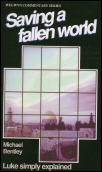
Saving a Fallen World: Luke Simply Explained
- Author: Michael Bentley
- Publisher: Evangelical Press
- Publication Date: 1993
- Pages: 336
At the heart of Luke’s Gospel is the truth that God sent his Son to seek and to save what was lost. More than any of the other Gospel writers, Luke shows us the Lord dealing with individual people and how their lives were changed as a result of their personal encounter with him. These people came from all ranks of society: the rugged fisherman, the poor widow, the wealthy tax collector, the ruler of the synagogue, the Roman centurion. As the only New Testament writer who was not a Jew, Luke consciously writes his account for Gentiles as well as Jews, showing that the message of the Gospel is for all kinds of people in this fallen world.
Michael Bentley is the pastor of Great Hollands Free Church in southern England, where he is also actively involved in the local community. Among other responsibilities he is vice-chairman of the Standing Advisory Council for Religious Education in the area, a director of the local Citizen’s Advice Bureau and vice-chairman of a neighborhood mediation service. He is author of several titles in the Welwyn Commentary Series, including Building for God’s Glory: Haggai and Zechariah, Shining in the Darkness: Philippians, and Passing on the Truth: 1 & 2 Timothy.
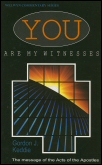
You Are My Witnesses: The Message of the Acts of the Apostles
- Author: Gordon Keddie
- Publisher: Evangelical Press
- Publication Date: 1994
- Pages: 336
Christians have always found the book of Acts to be enjoyable, exciting, and encouraging. Here we find our own roots as followers of Jesus and learn what it means to be citizens of heaven while living upon the earth. If the Gospels tell us what the gospel is, Acts tells us what the gospel does.
Acts is first and foremost the history of the work of the Holy Spirit in the church. It brings together the promises of “another Counselor,” who would lead the disciples into all truth and the Great Commission to preach the Gospel to the whole world in the assurance that he would be with them always, “to the very end of the age.”
Acts is also the record of costly campaigning against a fiercely resistant enemy, over the eternal destiny of lost men and women. The sounds of battle echo from almost every scene. But so also does the scent of victory, as lives are changed and the light of Christ spreads from nation to nation!
As the book of Acts closes, the work still goes on. The fulfillment of Christ’s commission continues today as his followers take up the unfinished task: “You will be my witnesses . . . to the ends of the earth.”
Gordon Keddie is the minister of Grace Presbyterian Church in State College, Pennsylvania.
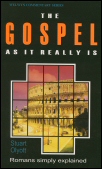
Perhaps no other part of Scripture has had as profound an influence on the history of the Christian church as Paul’s epistle to the Romans. Luther said of Romans, “It can never be read or considered too much or too well, and the more it is handled, the more delightful it becomes and the better it tastes.”
In this book the author aims to present a simple introduction to Romans for the ordinary reader. His exposition gets straight to the heart of the passage, avoiding technicalities or obscure textual criticism.
Stuart Olyott has many years of pastoral experience. In Lausanne, Switzerland, he was pastor of L’Eglise Evangelique Baptiste and involved in pioneer work in several areas. He is currently ministering in a large inner-city church in Liverpool, England. He is author of several books, including several in the Welwyn Commentary Series.
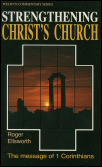
Strengthening Christ’s Church: The Message of 1 Corinthians
- Author: Roger Ellsworth
- Publisher: Evangelical Press
- Publication Date: 1995
- Pages: 272
Paul’s first letter to the Corinthians was directed to a deeply troubled church in the midst of a very challenging world. The problem was that the church was contaminated by society’s sins and confused in its thinking.
If this sounds hauntingly familiar it is because it hits perilously close to home. Today’s church finds herself in a frighteningly secular world, one in which paganism is aggressive and militant. Opportunities are great but the church often seems to be as contaminated and confused as the church at Corinth.
Paul’s letter is a clarion call to the Christians in Corinth and to Christians today to come away from contamination and confusion to function as salt and light.
Roger Ellsworth is pastor of Parkview Baptist Church in Jackson, Tennessee. He is the author of more than 40 books.
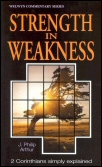
The future of the Christian cause depends to a large degree on the quality of the next generation of spiritual leaders. Where will these men find role models? To whom will they turn for inspiration? There is the ever-present danger that they will do as Paul’s rivals did in Corinth and turn to the world outside the church and try to emulate the qualities that make for success in secular life. Indeed, it is not exaggerating to observe that the churches of the modern West, like the church at Corinth, face a crisis of authority and leadership. In 2 Corinthians we have both a stern warning that we should avoid styles of leadership that are worldly, perhaps even cultic while cultivating the kind of leadership that Paul himself showed—leadership that was self-sacrificing and self-giving, a model of loving service based on the character of Christ himself.
J. Philip Arthur grew up in the northeast of England. Arthur studied history at Cambridge and then earned his living first as a teacher and then as a lecturer in his native county Durham. In 1988 he became pastor of Free Grace Baptist Church in Lancaster.
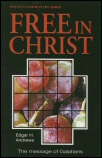
Free in Christ: The Message of Galatians
- Author: Edgar Andrews
- Publisher: Evangelical Press
- Publication Date: 1996
- Pages: 320
Paul’s epistle to the Galatians can be summarized by one simple question: What is the gospel? What is the real gospel, as opposed to false gospels, or (to use Paul’s own terminology) perverted gospels? One recent commentator has written, “Historically, Galatians has been foundation for many forms of Christian doctrine, proclamation, and practice. And it remains true today to say that how one understands the issues and teaching of Galatians determines in large measure what kind of theology is espoused, what kind of message is proclaimed, and what kind of lifestyle is practiced.”
This commentary by Edgar Andrews on the book of Galatians is a clear, concise, and practical exposition of the Apostle Paul’s great letter. Dr. Andrews addresses the massive issues of the book of Galatians with a clarity and relevance that will be appreciated by all those who have an interest in promoting the true Gospel of Christ. This timely book will enable readers to define the gospel clearly and biblically and to recognize the dangerous errors and trends developing in the evangelical church today.
This is must reading for those whose chief concern is to preach Christ and him crucified. I highly recommend this book to pastors and lay people alike.
—Robert L. Dickie, pastor in Michigan
Edgar Andrews is emeritus professor at the University of London and co-pastor of the Campus Church, Welwyn Garden City, Hertfordshire, England. He is also joint editor of the Evangelical Times. He has written Christ and the Cosmos, From Nothing to Nature, The Spirit Has Come, and other books.
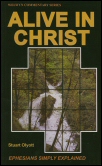
When we begin to understand Paul’s epistle to the Ephesians, something wonderful happens to our spiritual life. Realizing how rich we are in Christ, we become filled with thankfulness and joy. We never envy non-Christians again. We see what it means to live as a Christian in today’s world. We become stable in our doctrinal understanding. In short, Ephesians produces exactly the sort of Christians we most need.
That is why this short commentary has been written. It is for those who want to begin to understand Paul’s great letter. More advanced believers will find spiritual refreshment here.
Stuart Olyott has many years of pastoral experience. In Lausanne, Switzerland, he was pastor of L’Eglise Evangelique Baptiste and involved in pioneer work in several areas. He is currently ministering in a large inner-city church in Liverpool, England. He is author of several books, including several in the Welwyn Commentary Series.
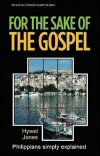
For the Sake of the Gospel: Philippians Simply Explained
- Author: Hywel Jones
- Publisher: Evangelical Press
- Publication Date: 2010
- Pages: 167
A comparison of the Epistle to the Philippians with the letters that Paul had written before it might seem to indicate that the church at Philippi had no censurable weaknesses at all. Such a thought, of course, cannot be true because just as “there is not a righteous man on earth who does good and never sins” (Eccl. 7: 20 ESV) so it is with churches, and even though the church at Philippi is not charged with any doctrinal deviation or moral blemish. At this point it is sufficient to note that as it was a church which could be prayed for (1:4) and preached to (1:28) it obviously did not have all it needed. It could gain more. It could even lose much of what it had (see 3:1–2; 17–18). In these general but important respects, it was a church like any other in any place or time. It could prosper or decline. The apostle Paul wrote so that it might grow (1:9–11, 25–30) and as he did so in the name of the Lord Jesus Christ, the only Head of the Church—what he wrote speaks to churches at the present time.
Hywel R. Jones became professor of practical theology at Westminster Seminary, California, in 2000. Prior to that he was editorial director of the Banner of Truth Trust and principal of London Theological Seminary from 1985–1996. He was a pastor at Grove Chapel, London, and Borras Park in Wrexham. He is the author of A Study Commentary on Job, also published by Evangelical Press.
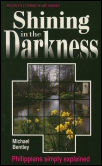
Chained Paul might be, this joyful prisoner of the Lord never wrote more warmly nor more wisely than in this letter to his friends in Philippi. Yet the apostle is not blind to faults, even of loyal brethren for whom he has a special affection. Evidently there was some dissension in this lively Christian community, due to personal jealousies and animosities. Unfortunately, the same can be just as true today. The Gospel is still at times preached from motives of selfish ambition and rivalry. All of us are still inclined to look after our own interests only. And fine Christian workers are still quarreling. This letter serves as a firm word of warning and a guide for right living.
Commentaries . . . can be of great value . . . Most of all we need the help of those whose work is to feed, guard, and care for God’s people week by week. Michael Bentley is just such an experienced pastor and teacher.
—R. C. Lucas, rector, St. Helen’s Bishopsgate, London
Once again, Michael Bentley displays his rare gift for communicating deep truths both clearly and simply. Easily accessible to the young believer, this commentary nevertheless contains insights that may well surprise and delight the busy pastor. Michael’s relaxed, street-level style should not deceive us! This volume would make a seriously useful addition to any Christian’s bookshelf.
—Jonathan Stephen, president-elect, Fellowship of Independent Evangelical Churches
Michael Bentley is the pastor of Great Hollands Free Church in southern England, where he is also actively involved in the local community. Among other responsibilities he is vice-chairman of the Standing Advisory Council for Religious Education in the area, a director of the local Citizen’s Advice Bureau and vice-chairman of a neighborhood mediation service. He is author of several titles in the Welwyn Commentary Series, including Building for God’s Glory: Haggai and Zechariah, Shining in the Darkness: Philippians, and Passing on the Truth: 1 & 2 Timothy.
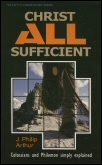
Paul, under house arrest in Rome, wrote two letters which were both sent to Colosse at the same time and by the same messenger, a man named Tychicus.
One of the letters we know as the epistle to the Colossians. It is packed with good things. Not a word is wasted. There was a problem in the church at Colosse, and it was this that prompted Paul to write. It seemed that there was a real danger that an impressionable young church might be seduced away from uncomplicated and straightforward devotion to Christ. There was a new mood in the church, a worrying tendency to be influenced by currents of thought from outside, from society at large—a danger that is still present in our own day.
The most important consequence of the new teachings was that they would wean people away from Christ in subtle ways by making them preoccupied with other things in addition to him. In order to counter this emphasis, Paul wrote a letter that is full of Christ. Read it, and it will work wonders for your confidence. In a variety of ways it makes the point that Christ is magnificent, that nothing can compare with him, and if we have Jesus, we have enough.
The second letter, the epistle to Philemon, was addressed to one of the members of the church in Colosse and related to another person from the same town. It is a highly personal letter, written from one Christian to another, and it has a fascination all its own. At its heart is a theme that is vital for all Christians—that of forgiveness. Christians are, by definition, a forgiven people, and forgiveness is an ongoing necessity in all our relationships. Few things bring the cause of God into more disrepute than Christians who begrudge reconciliation.
J. Philip Arthur grew up in the northeast of England. Arthur studied history at Cambridge and then earned his living first as a teacher and then as a lecturer in his native county Durham. In 1988 he became pastor of Free Grace Baptist Church in Lancaster.
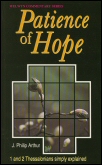
Patience of Hope: 1 & 2 Thessalonians Simply Explained
- Author: J. Philip Arthur
- Publisher: Evangelical Press
- Publication Date: 1997
- Pages: 160
Paul’s epistles to the Thessalonians were written to a young church and one that was facing persecution. Yet, in the midst of their difficulties, these new converts were noted for their “work of faith, labor of love, and patience of hope in our Lord Jesus Christ.” In the way that he dealt with their problems, the apostle has left Christians in all ages with teaching, ideally suited for the challenges they face.
In his first epistle we have a priceless opportunity to look into the heart of Paul himself and discover the burning passion for Christ and his Gospel which made him the man that he was. Both the apostle himself and the believers at Thessalonica set for us an example in evangelism and their concern to bring others to faith in Christ.
Paul’s instructions to these new converts on the practical implications of holiness, and how to love an orderly life that was pleasing to God and would not bring the Gospel into disrepute, have much to say to people brought to Christ today from a background of religious pluralism and moral climate where anything goes.
In these two epistles we also find two of the clearest statements in the whole New Testament about the Second Coming of Christ and the end of the age. We, too, can find encouragement in the face of present difficulties as, like the Thessalonians, we in our day seek to “serve the living God, and to wait for his Son from heaven.”
J. Philip Arthur grew up in the northeast of England. Arthur studied history at Cambridge and then earned his living first as a teacher and then as a lecturer in his native county Durham. In 1988 he became pastor of Free Grace Baptist Church in Lancaster.
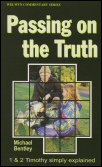
Paul wrote his first epistle to Timothy so that the Christians at Ephesus should “know how people ought to conduct themselves in God’s household, which is the church of the living God, the pillar and foundation of the truth.” The epistle contains a wealth of practical help and guidance on the administration and care of local churches, including the roles of men and women, the appointment and responsibilities of church officers, the financial support of elders and the care of widows.
The second epistle to Timothy was to be Paul’s last letter, written from prison as he awaited his final trial and execution. In it we catch a glimpse of the human side of the great apostle as he feels loneliness and longs for a last visit from his younger friend.
Central to both epistles is the theme of the apostle’s concern to warn against false doctrines and his charge to Timothy, and through him to succeeding generations of believers down the ages, to guard faithfully as a precious deposit the truth entrusted to him by Paul and the other apostles and to pass it on to others.
Michael Bentley is the pastor of Great Hollands Free Church in southern England, where he is also actively involved in the local community. Among other responsibilities he is vice-chairman of the Standing Advisory Council for Religious Education in the area, a director of the local Citizen’s Advice Bureau and vice-chairman of a neighborhood mediation service. He is author of several titles in the Welwyn Commentary Series, including Building for God’s Glory: Haggai and Zechariah, Shining in the Darkness: Philippians, and Passing on the Truth: 1 & 2 Timothy.
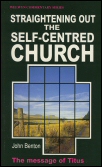
Many Christians are uneasily aware that there is a gap between their conscious commitment to the Lord Jesus and their practical, day-to-day living. This does not always arise from conscious disobedience to the Lord. Often sincere Christians find that this gap is opening up in their lives and they are rather bewildered by it. Something is happening which they do not quite understand, and they are not sure what to do about it.
This dichotomy between belief and behavior is the central theme of Paul’s letter to Titus and the epistle has much to say to our generation of Christians today. As Paul writes to Titus, he is well aware of the problem. But he has a sure and firm answer. The apostle provides us with spiritual dynamite to blast a way out of the prison of subjectivism and self-centered living into the freedom and integrity which are ours in Christ.
Titus is not just a book for trainee pastors, elders, and Christian leaders. It is a book which has an urgent message for us all.
John Benton is pastor of Chertsey Street Baptist Church, Guildford, England, and editor of Evangelicals Now.
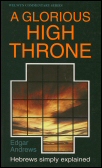
The epistle to the Hebrews begins by unveiling the glory of Christ—the eternal Son of God who shares the everlasting throne of “the Majesty on high.” It shows in entrancing detail how he descended from that throne to become a man, that he might rescue his people from death, judgment, and the power of sin.
How? By inaugurating a new covenant—“the new covenant in my blood”—replete with better promises, a better priesthood, a better sacrifice, and a better hope than had hitherto prevailed under the Law of Moses. By one offering for sin forever, Christ our great High Priest has perfected forever those he has set apart for his glory and who come to God through him. He is their advocate, their rest, their righteousness, their example, and their “exceeding great reward.”
Professor Andrews has tackled the task of unraveling the twists and turns of Hebrews with obvious enthusiasm and equally obvious integrity. None of the ‘problem passages’ is ignored, and none of the text is glossed over, while his careful scholarship is made accessible by the use of apt illustrations. Best of all, every page is full of Christ and ‘the grace of God that brings salvation.’ This volume will be of enormous help to the busy preacher, the enquiring student, and the ordinary Christian who wants to learn more about this wonderfully rich New Testament letter, and to apply its teaching to the problems and pressures of living a godly life in a godless world.
—John Blanchard, author, Banstead, Surrey
Edgar Andrews is emeritus professor at the University of London and co-pastor of the Campus Church, Welwyn Garden City, Hertfordshire, England. He is also joint editor of the Evangelical Times. He has written Christ and the Cosmos, From Nothing to Nature, The Spirit Has Come, and other books.

Practice Makes Perfect: James Simply Explained
- Author: Anthony Bird
- Publisher: Evangelical Press
- Publication Date: 2008
- Pages: 160
At first glance, James appears to be one of the most practical books in the New Testament. The letter is filled with advice about facing the trials of life, coping with poverty, the desire to be rich, controlling the tongue, making plans for the future, and more. James underlines the need to be active, practicing believers. We are to be those who do not merely listen to the Word, but do what it says. However, no matter how enthusiastically we embrace a practical approach to the Christian life, it has no value unless it is based upon God, who is the source of that life. As Tony Bird demonstrates in this commentary, what is remarkable about the letter of James is the glorious vision it presents of God, the descriptions of whom are both extensive and breathtaking. Reading it ought to drive us to contemplate afresh the wonder of God and then lead us to worship him.
Tony Bird is a lecturer in biblical studies at the Presbyterian Theological College in Melbourne, Australia. Bird is a former missionary in Indonesia, along with his wife Carole. Tony is active in Donvale Presbyterian Church where he preaches regularly.
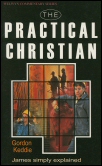
The Practical Christian: The Message of James
- Author: Gordon Keddie
- Publisher: Evangelical Press
- Publication Date: 1993
- Pages: 256
How does the Christian cope with the real world? How do we put our faith into action and live in anticipation of the Lord’s return? The epistle of James is a manual for practical godliness. Everything is here, including facing trials, blaming God for misfortunes, snobbery, sharp tongues, faith and works, squabbling in churches, worldliness, and the use of money.
In this searching and straightforward commentary, Gordon Keddie confronts the reader with a challenge—to apply James’ message to our hearts and put it into practice in our lives.
Gordon Keddie is the minister of Grace Presbyterian Church in State College, Pennsylvania.
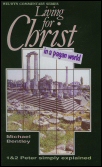
The people to whom Peter wrote his first epistle were already undergoing trials of all kinds and were soon to face fierce persecution for their faith at the hands of the cruel Emperor Nero. The apostle writes to encourage and strengthen them in the face of these trials and to remind them of the wonderful blessings and privileges they have in Christ.
He has a great deal to say about relationships, both to fellow Christians and to unbelievers, in the workplace and in the home, in the local church and in society at large.
In his second epistle Peter warns his readers against another danger that has threatened believers through the ages, that of false teaching. He points them to God’s Word as their one sure light amid the darkness and confusion of error and urges them to live holy lives in the light of the Lord’s returns.
Michael Bentley explains the text in a clear and helpful way, drawing on personal experience and illustrations from everyday life. He seeks to show what it means to live for Christ in a pagan world.
Michael Bentley is the pastor of Great Hollands Free Church in southern England, where he is also actively involved in the local community. Among other responsibilities he is vice-chairman of the Standing Advisory Council for Religious Education in the area, a director of the local Citizen’s Advice Bureau and vice-chairman of a neighborhood mediation service. He is author of several titles in the Welwyn Commentary Series, including Building for God’s Glory: Haggai and Zechariah, Shining in the Darkness: Philippians, and Passing on the Truth: 1 & 2 Timothy.

Knowing Where We Stand: The Message of John’s Epistles
- Author: Peter Barnes
- Publisher: Evangelical Press
- Publication Date: 1998
- Pages: 160
“Assurance is not essential to salvation, but it is essential to the joy of salvation,” as Martyn Lloyd-Jones once said. John, who was by this time probably the last surviving apostle, wrote his first epistle to those who believed in the name of the Son of God in order that they might know that they possessed eternal life.
In these days of spiritual and moral decline we stand in particular need of the message of John’s epistles. We need to test ourselves first to see where we stand before God and then, with charity of heart and clarity of mind, we need to test the claims of others, too. That is why John’s epistles are so important for us. With good reason, Martin Luther wrote of 1 John, “I have never read a book written in simpler words than this one, and yet the words are inexpressible.”
In this commentary Peter Barnes shows how John gave his readers three main tests so that they could come to assurance of salvation and could tell, among the conflicting claims of different groups within the church, who was right and who was wrong on spiritual matters. These three themes of right belief, love, and obedience also figure prominently in John’s shorter, and more personal, second and third epistles.
Peter Barnes has written an excellent commentary on John’s epistles. It is a thorough, stimulating, and informed study of these epistles. His is a valuable tool for pastors, students, and laymen. I heartily recommend it.
—John D. Currid, associate professor of Old Testament, Reformed Theological Seminary, Jackson, Mississippi
Peter Barnes is the minister of Nambucca River Presbyterian Church in New South Wales, Australia. He is the author of several books, including The Gospel: Did Paul and Jesus Agree?
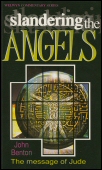
In a society where the claim that we can know absolute truth is dismissed as ridiculous, and moral standards are disregarded if they interfere with personal enjoyment, the church is under threat in two ways. Tired of swimming against the tide, it can be tempted to throw away its commitment to biblical standards of behavior and to the uniqueness of Christ as the only Lord and Savior in the quest for social acceptability. At the same time, in a longing to see God at work in revival and the desire to be seen to be successful, Christians may be open to accept anything that causes a sensation and attracts a crowd, even if it departs from the biblical gospel.
The epistle of Jude was written to combat false teaching which in many ways encapsulates all the worst dangers to the church and the biblical gospel today. John Benton urges his readers to regain Jude’s vision of contending for the faith, not just at the intellectual level, but at the level of responsible Christian living and practical, loving Christianity for those led astray.
John Benton is pastor of Chertsey Street Baptist Church, Guildford, England, and editor of Evangelicals Now.
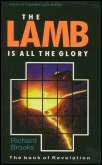
The Lamb is all the Glory: Revelation
- Author: Richard Brooks
- Publisher: Evangelical Press
- Publication Date: 1993
- Pages: 222
The book of Revelation is the glorious culmination of Scripture. Everything focuses on the one who is the Lord of Glory—Jesus Christ. Richard Brooks comes afresh to the message of Revelation with a warm, pastoral exposition that feeds the hearts as well as the mind of the reader. As with all the Welwyn Commentaries, this volume is practical, clearly written, and easy to understand. Above all, it points us to the glorious victory that awaits all those who faithfully follow the Lamb of God.
Richard Brooks comes afresh to the message of Revelation with a warm, pastoral exposition that feeds the heart as well as the mind of the reader. As with all the Welwyn Commentaries, this volume is practical, clearly written, and easy to understand. Above all, it points us to the glorious victory that awaits all those who faithfully follow the Lamb of God.
—Dr. Joel R. Beeke, president and professor of systematic theology and homiletics at Puritan Reformed Theological Seminary, Grand Rapids, MI
Richard Brooks is the pastor of York Evangelical Church in England. He is also author of Focus on the Bible: Song of Songs.
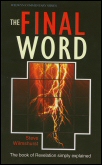
The book of Revelation was written for a people under pressure. It is a survival manual, explaining how to survive when the world is against you. This book was not written for us to speculate over while we put our feet up. The churches to whom it was first written didn’t have the luxury of doing that. It is here to help Christians to survive in a hostile world, and that is how we need to study it. This book is not for theologians to fight over; it is for ordinary believers to keep fighting the real fight. This is why Revelation is so vitally relevant for our day.
Supremely, the book of Revelation is the story of our Lord Jesus Christ, God’s Final Word. This is the point of all the spectacular visions, to nail it down for God’s people still living in this fallen world with all its suffering and pain: “See, this is who your Jesus is, the Lord of your history, greater far than all your enemies, the beginning and the end, Alpha and Omega. This glorious Lord Jesus is coming again, and he is coming soon. So be faithful. Keep his words; be true to him.”
What a pleasure to find a commentary on Revelation which is so eminently readable! Although notoriously difficult material is cleared up with apparently effortless ease, the author manages at the same time to stretch the mind, stir the heart, and challenge the will. Packed with unfailingly relevant illustrations and anecdotes, The Final Word succeeds in drawing sound doctrinal conclusions while remaining free of undue dogmatism. This is undoubtedly one of the best popular treatments available of the apostle John’s great legacy.
—Jonathan Stephen, director of affinity and principal of Wales Evangelical School of Theology, Bridgend
Steve Wilmshurst studied physics at Cambridge University and then had a career in the nuclear industry. He subsequently retrained in theology at Trinity College, Bristol, England, where he specialized in New Testament. He is currently director of training at Kensington Baptist Church in Bristol and chairs the Affinity Theological Team.
Reviews
2 ratings
John Zietlow
5/4/2023
This is my favorite commentary of the many to which I refer. Highly recommended!
Maryellen J Lewis
12/8/2016